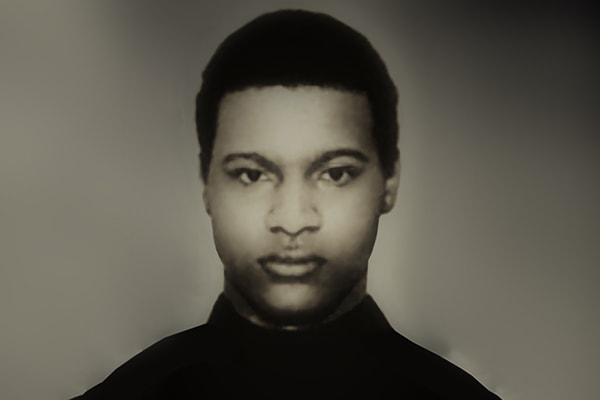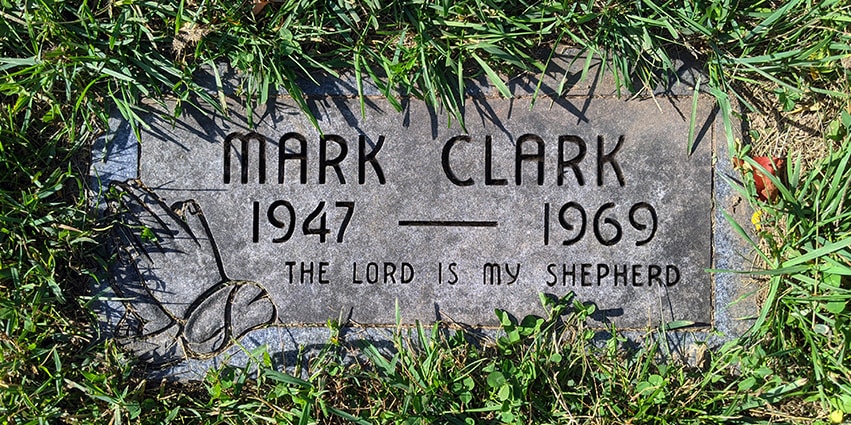On February 12, 2021, Judas and the Black Messiah debuted on HBO Max and in select theaters around the country. The film fully contextualizes the details of Black Panther Chairman Fred Hampton’s life, as well as his subsequent death at the hands of the Chicago Police Department on December 4, 1969. Shaka King co-wrote and directed the film; Variety has already proclaimed it a Best Picture contender at the Oscars, while Daniel Kaluuya’s performance as Fred Hampton is drawing Best Actor buzz. Tragically, Fred Hampton wasn’t the only Black Panther to lose his life that day in 1969.
Becoming an Activist
Mark Clark, 22-year-old defense captain of the Peoria Black Panther Party, died alongside Hampton at 2337 W. Monroe St. in Chicago. Half a century later, Clark and Hampton’s deaths were the centerpiece of the “The Black Panther Party 50-Year Retrospective Exhibit” at the Movement & Justice Gallery inside the Westside Justice Center in Chicago. That same year, columnist Phil Luciano toured the exhibit with the executive director, Tanya Woods, for a feature in the Peoria Journal Star. Reflecting on the 1960s Civil Rights Movement, Woods noted, “We lost Fred, we lost Dr. (Martin Luther) King, we lost Malcolm (X), we lost Mark Clark. I don’t think people realize this happened so fast.” A mural featuring Fred Hampton and Mark Clark now adorns a building just a mile from where both men lost their lives.
Mark Clark’s contributions would likely have remained in the dusty archives of newspaper clippings and legal documents if not for the dedicated efforts of his sister, Gloria Jackson (Clark). Last year, she published Mark Clark: Soul of a Black Panther, a book about her brother’s life and legacy. In addition to describing the events that took place on December 4, 1969, the book details her experience growing up with Mark in Peoria, attending Lincoln Elementary School together, and his maturation into a civil rights activist. What emerges from these loving vignettes is the portrait of a deeply creative and intellectual young man with principled convictions and a belief in direct action. At a very young age, Mark demonstrated a talent for speech and acting—and was even invited to become a member of the Peoria Players.

These talents are what made him such an effective leader and organizer of the first chapter of the Peoria Black Panther Party. In that role, Mark was instrumental in establishing a free breakfast program at the Ward Chapel AME Church in collaboration with Pastor Blaine Ramsey—the legacy of which can still be seen at the church today. Cleo Carter is director of the church’s breakfast ministry and, with a group of volunteers, continues to feed the community year after year. Reflecting on Mark Clark’s activism for the Community Word in 2016, Carter stated, “He went to almost every church in this community asking to start a free breakfast program, and he was refused everywhere except here. Pastor Blaine Ramsey said yes. Mark served food to children five days a week for months until church members voted to discontinue his involvement because of the FBI investigation.”
A foundational tenet of the Black Panther Party, the Breakfast for Children Program drew the attention of J. Edgar Hoover and became a target for FBI surveillance as it generated favorable publicity. Sadly, Clark’s empathy and efforts to feed hungry children in Peoria played a role in his untimely death. “What I loved most about Mark was that he always stood up for the underdog,” Gloria writes. “He had an innate sense of fairness and if he thought something was not right, he would immediately intervene and make his objections known. By the time Mark had joined the Black Panther Party, he had already influenced my life greatly and I knew firsthand the character and principles that he stood upon.” In 2011, Mark Clark was formally recognized as a civil rights activist by the African American Hall of Fame Museum in Peoria.
Honoring His Memory
Unfortunately, many of the same issues of disenfranchisement and discrimination witnessed by Mark Clark remain in our classrooms and communities today. In 2019, a report found that the Peoria metro area had the most segregated schools of any area in the country—and one of the highest Black poverty rates in the state. The report aptly identifies a key aspect of the River City that has come to symbolize this divide. “In Peoria, the Illinois River is a 900-foot-wide chasm between poverty and prosperity,” it states. “On one bank is the city of East Peoria, which is 92 percent white, with big-box retail stores including Costco, Target and a Bass Pro Shop just a stone’s throw from the river. On the west bank is the city of Peoria itself, just 57 percent white and becoming less so every year.”
Located at 1 College Drive on the East Peoria side of the river is the main campus of Illinois Central College. Mark Clark attended Illinois Central College shortly after its founding in 1967. Historically, community colleges have been the educational drivers of upward mobility. Offering flexible scheduling and varying curricular trajectories, from career training to transfer credits, community colleges provide an accessible, affordable alternative to a traditional four-year college or university. However, approximately 74.9 percent of the student population at Illinois Central College identify as white, while only 11.4 percent identify as Black or African American.
To honor Mark Clark’s life and legacy, a scholarship has been established in his memory specifically for students who identify as Black or African American: Seize the Time Scholarship in Honor of Mark Clark. This scholarship is both an attempt to minimize the economic barriers preventing Black and African American students from pursuing their educational goals, while also rewarding and acknowledging ambition and excellence. To learn more about the scholarship, visit seizethetime.org. For more information about Mark Clark, visit activistmarkclark.org. PM
Joshua Finnell is an associate professor in the University Libraries at Colgate University and a 2000 graduate of Illinois Central College.




